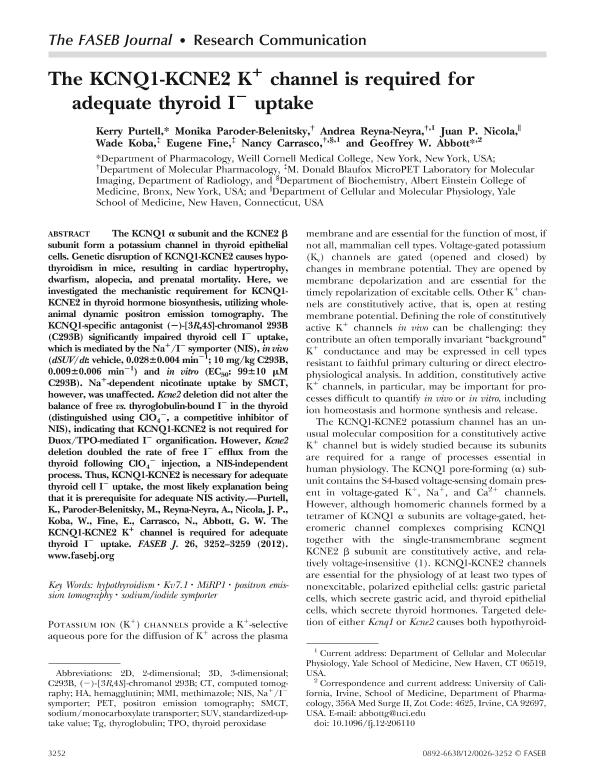Artículo
The KCNQ1-KCNE2 K+ channel is required for adequate thyroid I- uptake
Purtell, Kerry; Paroder-Belenitsky, Monika; Reyna-Neyra, Andrea; Nicola, Juan Pablo ; Koba, Wade; Fine, Eugene; Carrasco, Nancy; Abbott, Geoffrey W.
; Koba, Wade; Fine, Eugene; Carrasco, Nancy; Abbott, Geoffrey W.
 ; Koba, Wade; Fine, Eugene; Carrasco, Nancy; Abbott, Geoffrey W.
; Koba, Wade; Fine, Eugene; Carrasco, Nancy; Abbott, Geoffrey W.
Fecha de publicación:
08/2012
Editorial:
Federation of American Societies for Experimental Biology
Revista:
FASEB Journal
ISSN:
0892-6638
e-ISSN:
1530-6860
Idioma:
Inglés
Tipo de recurso:
Artículo publicado
Clasificación temática:
Resumen
The KCNQ1 α subunit and the KCNE2 βsubunit form a potassium channel in thyroid epithelial cells. Genetic disruption of KCNQ1-KCNE2 causes hypothyroidism in mice, resulting in cardiac hypertrophy, dwarfism, alopecia, and prenatal mortality. Here, we investigated the mechanistic requirement for KCNQ1-KCNE2 in thyroid hormone biosynthesis, utilizing whole-animal dynamic positron emission tomography. The KCNQ1-specific antagonist (-)-[3R,4S]- chromanol 293B (C293B) significantly impaired thyroid cell I- uptake, which is mediated by the Na+/I- symporter (NIS), in vivo (dSUV/dt: vehicle, 0.028±0.004 min-1; 10 mg/kg C293B, 0.009±0.006 min-1) and in vitro (EC50: 99±10 μM C293B). Na+-dependent nicotinate uptake by SMCT, however, was unaffected. Kcne2 deletion did not alter the balance of free vs. thyroglobulin-bound I- in the thyroid (distinguished using ClO 4-, a competitive inhibitor of NIS), indicating that KCNQ1-KCNE2 is not required for Duox/TPO-mediated I- organification. However, Kcne2 deletion doubled the rate of free I- efflux from the thyroid following ClO4- injection, a NIS-independent process. Thus, KCNQ1-KCNE2 is necessary for adequate thyroid cell I- uptake, the most likely explanation being that it is prerequisite for adequate NIS activity. © FASEB.
Archivos asociados
Licencia
Identificadores
Colecciones
Articulos(CIBICI)
Articulos de CENTRO DE INV.EN BIOQUI.CLINICA E INMUNOLOGIA
Articulos de CENTRO DE INV.EN BIOQUI.CLINICA E INMUNOLOGIA
Citación
Purtell, Kerry; Paroder-Belenitsky, Monika; Reyna-Neyra, Andrea; Nicola, Juan Pablo; Koba, Wade; et al.; The KCNQ1-KCNE2 K+ channel is required for adequate thyroid I- uptake; Federation of American Societies for Experimental Biology; FASEB Journal; 26; 8; 8-2012; 3252-3259
Compartir
Altmétricas



